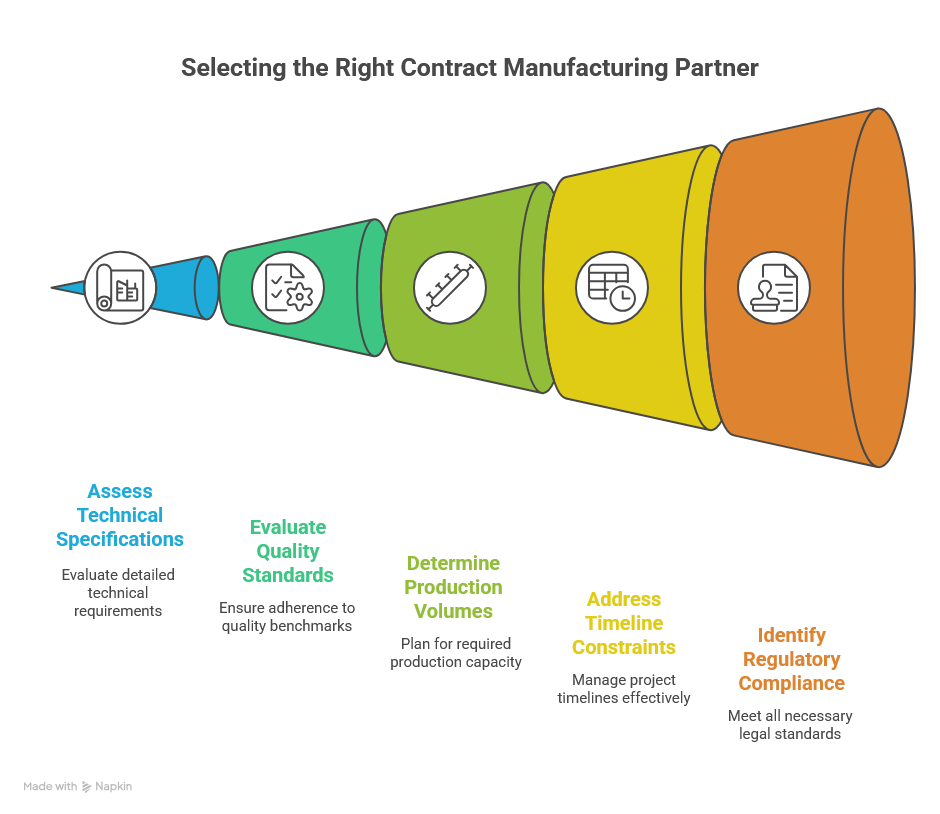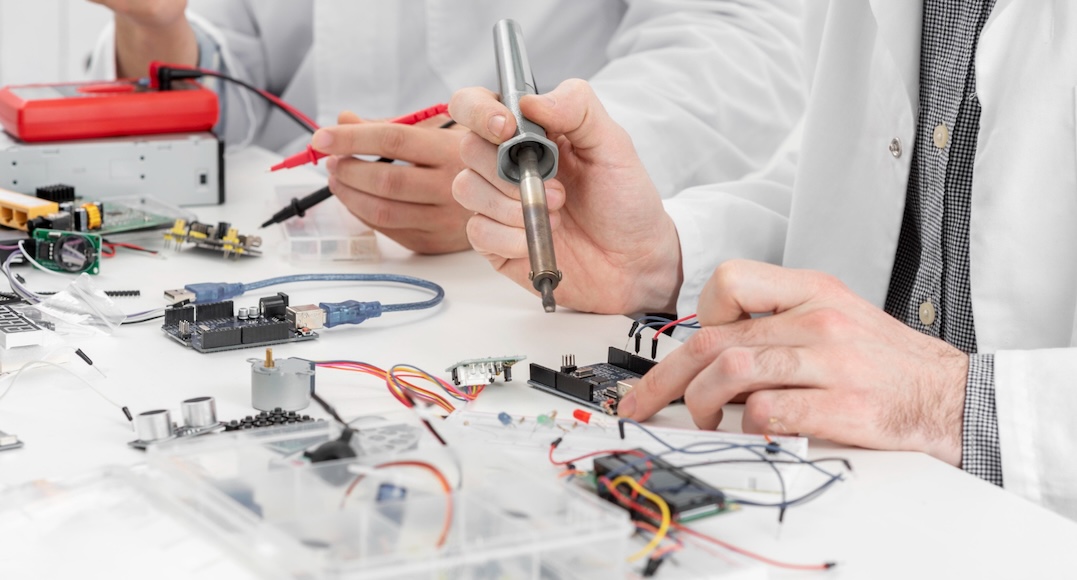When Tesla produces electric vehicles or Apple launches new iPhones, neither company manufactures the complex electronics internally. As product complexity increases and time-to-market pressures intensify, traditional in-house manufacturing approaches face capital constraints, workforce shortages, and scalability limitations that threaten competitive positioning.
Contract manufacturing provides the strategic solution, enabling OEMs (Original Equipment Manufacturers) to leverage specialized expertise while focusing on innovation and market expansion. This guide explores why outsourcing has become essential, how to select optimal partners, and what capabilities ensure project success from prototype through production.
To understand why this strategic shift has become essential, it’s important to first examine what contract manufacturing entails and how it fundamentally differs from traditional manufacturing approaches.

Electronic contract manufacturing (ECM) is a business model where OEMs hire specialized manufacturing companies to handle hardware production processes. Contract Electronics Manufacturers (CEMs) provide custom design, engineering, and manufacturing services spanning from component sourcing through final assembly.
Electronics Manufacturing Services (EMS) companies manage the complete production spectrum: PCB fabrication, component assembly, testing, and box-build services. The partnership structure involves OEMs providing designs and intellectual property while contract manufacturers handle production execution.
This model allows companies to focus on research and development while accessing specialized manufacturing expertise. CEMs offer comprehensive services from component design through packaging, enabling faster market entry without capital investment in manufacturing facilities.
While understanding the operational mechanics of contract manufacturing provides important context, the critical question for OEMs is determining when this model becomes necessary rather than simply beneficial.
Modern electronics production complexity creates compelling reasons why OEMs increasingly rely on specialized manufacturing partners rather than attempting internal production.
Electronics manufacturing requires millions in specialized equipment, clean rooms, and testing infrastructure. Rapid technology advancement makes equipment obsolete quickly, demanding continuous reinvestment that diverts resources from core business activities.
The electronics industry faces critical shortages of experienced technicians and engineers. Building internal teams requires extensive training programs and competitive compensation that many OEMs cannot sustain.
Managing hundreds of global suppliers, component sourcing, and logistics coordination represents a full-time operational challenge. Component obsolescence and availability issues severely impact production schedules and costs.
FDA regulations and ISO 13485 compliance require extensive quality systems. Internal development of medical-grade capabilities requires years of investment, causing delayed launches and missed opportunities. Specialized partners provide existing certifications and proven compliance systems.
Read more about Medical Device Contract Manufacturing: End-to-End Solutions for OEMs
IATF 16949 standards demand automotive-qualified processes and components. Quality failures result in costly recalls and brand damage. Automotive-specialized manufacturers offer established supplier networks and testing capabilities.
Read more about Automotive Electronics Manufacturing: Trusted EMS Partner for EV and Smart Car
High-frequency design expertise and signal integrity optimization requirements create performance challenges. Network reliability failures affect coverage quality. Advanced RF design and high-speed PCB manufacturing capabilities address these demands.
Having established why contract manufacturing has become essential, the next step is understanding how specialized manufacturing partners address these specific challenges through comprehensive solution frameworks.
Strategic partnerships with experienced manufacturers provide targeted solutions addressing operational, financial, and technical challenges facing modern OEMs.
Full-service providers offer comprehensive solutions from concept through delivery. Advanced capabilities enable complex designs while reducing development time through modular approaches and extensive material libraries. Design for manufacturability principles eliminate common defects and reduce iterations.
Contract manufacturers manage entire supply chains from component sourcing through delivery. Established supplier networks and purchasing power optimize component sourcing while reducing costs and improving availability.
Comprehensive testing protocols, including automated optical inspection, in-circuit testing, and electromagnetic compatibility testing, ensure superior quality. Validated quality systems increase yield significantly while reducing rework rates.
Modern manufacturers offer capabilities scaling from prototype quantities through high-volume production without minimum order constraints. Significantly shortened production cycles accelerate product launches while providing competitive advantages.
Different sectors present unique challenges requiring specialized expertise and tailored approaches.
| Industry | Key Requirements | Specialized Capabilities |
|---|---|---|
| Medical Devices | ISO 13485, FDA compliance | Biocompatibility, traceability systems |
| Automotive | IATF 16949, environmental testing | Qualified components, reliability testing |
| Telecommunications | High-frequency design, signal integrity | RF expertise, advanced materials |
| Industrial IoT | Harsh environments, long lifecycles | Environmental testing, durability design |
Understanding these solution capabilities provides the foundation for evaluating potential electronics manufacturing partners, but successful partnerships require systematic assessment criteria to ensure optimal alignment with specific project requirements.
Beyond technical capabilities, a thorough evaluation ensures that your manufacturing partner can deliver consistency, reliability, and scalability for your business.
Assess technical specifications, quality standards, production volumes, and timeline constraints. Identify regulatory compliance needs and scalability requirements for future growth.
Review manufacturing equipment, technical expertise, and capacity. Assess quality certifications, financial stability, and supplier networks. Validate long-term viability and continuous improvement processes.
Address design transfer protocols, intellectual property protection, and communication structures. Establish quality consistency measures and project management frameworks.

While these selection criteria help identify capable manufacturing partners, the specific capabilities and proven track record of your selected partner ultimately determine project success and long-term partnership value.
KINGBROTHER integrated competencies deliver measurable results across demanding applications.
KINGBROTHER brings nearly three decades of specialized experience serving over 18,000 customers worldwide. Our IPD approach addresses customers’ hardware development challenges, including high costs, long timelines, and quality control issues:
Our advanced PCB capabilities address key challenges such as high manufacturing complexity and inconsistent product quality, achieving improvements in both yield and production capacity:
KINGBROTHER’s IPDM framework eliminates technology gaps, adapts to diverse industry demands, and accelerates service response times. By bridging R&D and production, it ensures seamless collaboration and lifecycle-wide quality assurance:

With five design centers and four manufacturing bases across China, KINGBROTHER delivers the advantages of global reach combined with localized support. This extensive footprint enables efficient project management, faster turnaround, and responsive customer service.
Certified to ISO 9001, ISO 13485, IATF 16949, and ISO 14001, KINGBROTHER meets the highest industry standards for medical devices, automotive electronics, and industrial applications—ensuring compliance, consistency, and reliability.
From prototype to high-volume production, KINGBROTHER adapts to your needs. With no minimum order quantity (MOQ), we enable cost-effective development at any scale. Quick-turn services accelerate product cycles, while seamless scaling guarantees quality across every stage of production.
Expert Consultation Process
Our specialists guide you from concept to production with proven methodologies.
Contract manufacturing is more than outsourcing — it’s a strategic partnership that accelerates innovation while reducing operational risk. KINGBROTHER brings:
Ready to accelerate your next project? Contact our technical team today to discuss your contract manufacturing requirements.